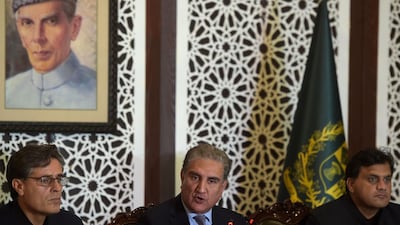The situation in Jammu and Kashmir should be resolved peacefully between India and Pakistan's leaders, diplomats at the UN urged on Friday, during a closed doors session of the Security Council where China took an unusually high-profile stance.
Having called the meeting on Pakistan's behalf, China's ambassador to the United Nations told reporters that the Himalayan region was “already very tense and very dangerous” and there was a need to “discard a zero-sum game mentality”.
Around the same time US President Donald Trump spoke by telephone with Pakistan Prime Minister Imran Khan, urging talks with India.
“The president conveyed the importance of India and Pakistan reducing tensions through bilateral dialogue regarding the situation in Jammu and Kashmir,” White House deputy press secretary Hogan Gidley said in a statement.
But at the UN in New York a divide between China, a strong supporter of Pakistan, and India was evident following a one-hour meeting, the first for the council over Jammu, a Hindu-majority area, and the more Muslim Kashmir, in decades.
“It's obvious that the constitutional amendment by India has changed the status quo in Kashmir, causing tension,” said Zhang Jun, referring to Indian Prime Minister Narendra Modi's decision on August 5 to strip autonomy from its portion of the territory.
“China opposes any unilateral action that complicates the situation and we call upon the relevant parties to exercise restraint,” said Mr Zhang, urging a negotiated solution.
But the recently appointed Chinese ambassador added: “India's action has also challenged China's sovereign interests and violated a bilateral agreement in the border area. China is seriously concerned.”
In response, Syed Akbaruddin, India's ambassador to the UN, accused the Chinese representative of trying to pass off his statement as being representative of the council and the broader international community, describing Kashmir as “an internal matter”.
“If there are issues, they will be discussed, they will be addressed by our courts; we don’t need international busybodies to try and tell us how to run our lives. We are a billion-plus people,” said Mr Akbaruddin.
China, which holds a permanent seat on the 15-member council, rarely calls such meetings but did so at the request of Pakistan, whose UN ambassador, Maleeha Lodhi, described Friday’s consultations as “the first and not the last step”.
“The fact that this meeting took place is testimony to the fact that this is an internationally recognised dispute,” she said. “The people of Jammu and Kashmir may be locked up but their voices were heard today at the United Nations.”
The council adopted several resolutions in 1948 and in the 1950s on the dispute between India and Pakistan over the region, including one which says a plebiscite should be held to determine the future of Kashmir.
Another resolution calls upon both sides to “refrain from making any statements and from doing or causing to be done or permitting any acts which might aggravate the situation”.
UN peacekeepers have been deployed since 1949 to observe a ceasefire between India and Pakistan in Jammu and Kashmir.
The council did not agree on a statement after Friday's meeting, but diplomats told The National there was a preference for India and Pakistan to resolve the problem bilaterally, without the UN becoming further involved.
“Only China and a couple of other countries wanted a joint statement,” one diplomat said. “But we think it is too early to do that. This was the first meeting and we needed to hear about what has happened. Making a statement so quickly could send the wrong signal to the parties involved.”
Before the council met Russia's deputy permanent representative to the UN, Dmitry Polyanskiy, also called for India and Pakistan to hold their own discussions. “We favour a bilateral track,” he said.
Kashmir has long been a flashpoint in ties between India and Pakistan, which both have nuclear arms. UN Secretary-General Antonio Guterres has called on the two countries to refrain from any steps that could affect Jammu and Kashmir’s special status.
Telephone and internet links were cut and public assembly banned just before Mr Modi revoked the special status under the Indian constitution of Jammu and Kashmir earlier this month. Before the council met an Indian official said authorities would begin restoring some telephone lines in the region on Friday night.

